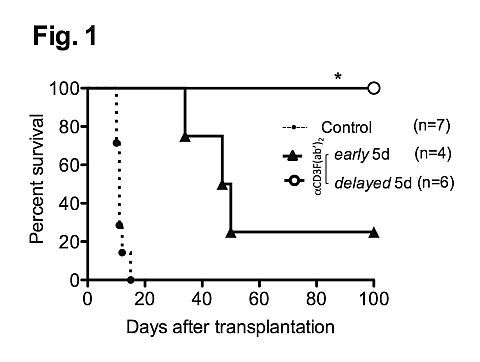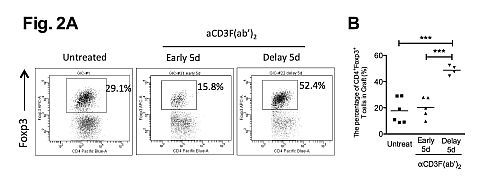Delayed Anti-CD3 Therapy Results in Depletion of Alloreactive T Cells and the Dominance of Foxp3+CD4+ Graft Infiltrating Cells
Transplantation Research Immunology Group, Nuffield Department of Surgical Sciences, University of Oxford, John Radcliffe Hospital, Oxford, United Kingdom
Université
Paris Descartes, Institut National de la Santé
et de la Recherche Médicale Unit 1013, Paris, France
Meeting: 2013 American Transplant Congress
Abstract number: 157
Background. The engineered Fc-nonbinding CD3 antibody has lower mitogenicity and a precise therapeutic window for disease remission in patients with type 1 diabetes. Before anti-CD3 can be considered for use in transplantation, the most effective timing of treatment relative to transplantation needs to be elucidated. Materials and Method. 50 Μg of anti-CD3 (145-2C11) F(ab’)2 fragments or saline were administered intravenously for 5 consecutive days (early: day -1 to 3 or delayed: day 3 to 7) to CBA (H2k) mice transplanted with cardiac allograft from C57Bl/10 (H2b) (day 0). Result. Survival of allografts was prolonged in mice treated with the early protocol (MST=48 days), but most were rejected by day 100. In contrast, in mice treated with the delayed protocol allografts continued to survive long-term (Fig. 1). The delayed protocol significantly inhibited donor alloreactivity at day 30 as compared to the early protocol. A marked increase in Foxp3+ T cells (50.3±1.6%) infiltrating the allografts in mice treated with the delayed protocol was observed (***p<0.0001 vs. early (24.9±2.1%)) at day 10 (Fig. 2AB); a finding that was maintained in the accepted cardiac allografts at day100. We conclude that the timing of treatment with anti-CD3 therapy is critical for inducing long-term graft survival. Delaying administration effectively inhibits the alloreactivity and promotes the dominance of intragraft Foxp3+ T cells allowing the long-term graft acceptance.


To cite this abstract in AMA style:
Goto R, You S, Zaitsu M, Chatenoud L, Wood K. Delayed Anti-CD3 Therapy Results in Depletion of Alloreactive T Cells and the Dominance of Foxp3+CD4+ Graft Infiltrating Cells [abstract]. Am J Transplant. 2013; 13 (suppl 5). https://atcmeetingabstracts.com/abstract/delayed-anti-cd3-therapy-results-in-depletion-of-alloreactive-t-cells-and-the-dominance-of-foxp3cd4-graft-infiltrating-cells/. Accessed February 6, 2026.« Back to 2013 American Transplant Congress
